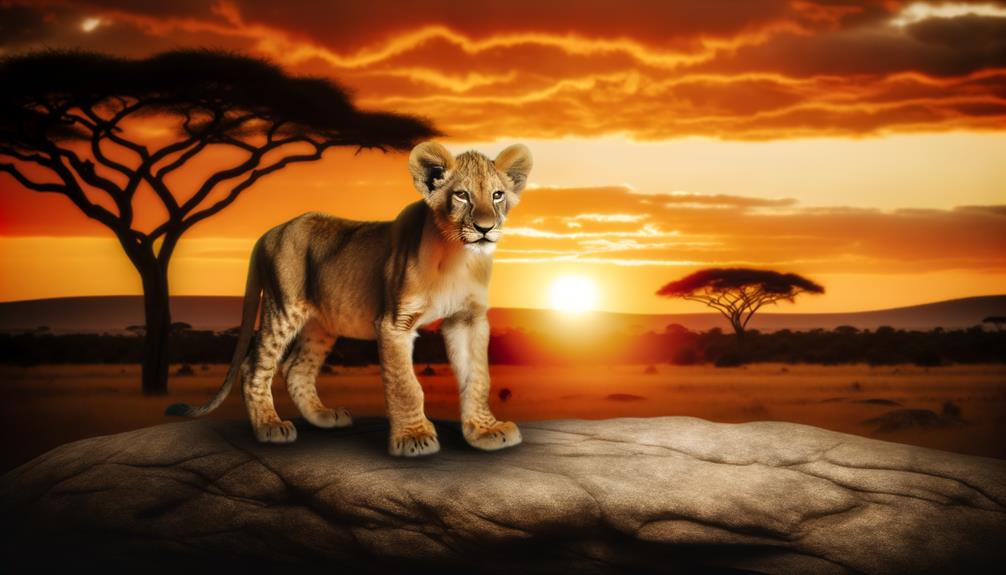Meaning of the Name Simba
The name 'Simba' derives from the Swahili language, directly translating to 'lion.' Originating from the Bantu language family in East Africa, it symbolizes strength and leadership. In African folklore, lions often embody kingship and cultural pride.
The name gained widespread recognition through Disney's "The Lion King," solidifying 'Simba' as a symbol of bravery and self-discovery. This global influence underscores the integration of African linguistic heritage into popular culture.
Additionally, 'Simba' continues to resonate in contemporary literature and media, representing existential themes and transcending its linguistic roots. To discover more intricacies, consider exploring further facets of 'Simba'.

Key Takeaways
- 'Simba' is derived from Swahili and means 'lion.'
- 'Simba' symbolizes strength, leadership, and kingship in African culture.
- Popularized globally by Disney's 'The Lion King.'
- In literature, 'Simba' represents bravery, nobility, and self-discovery.
- The name 'Simba' connects Swahili heritage with global culture.
Etymology and Origin
The name 'Simba' is derived from the Swahili language, where it literally translates to 'lion.'
Swahili, a Bantu language widely spoken in East Africa, incorporates words from various languages, including Arabic, due to historical trade and cultural exchanges.
The term 'simba' has been consistently used in Swahili-speaking regions to denote the majestic feline, embodying strength and nobility.
Linguistically, it is a straightforward noun without complex derivations, reflecting the simplicity and directness often found in natural language terms for prominent animals.
The adoption of 'Simba' into global vernacular, particularly through media, underscores the seamless integration of African linguistic elements into broader cultural contexts, attesting to the fluidity and adaptability of language across diverse societies.
Cultural Significance
In addition to its linguistic roots, the name 'Simba' holds profound cultural significance, particularly within African communities and globally through its representation in popular media. This name, intrinsically linked to the Swahili word for 'lion', resonates deeply in various cultural contexts.
Historically, lions have been emblematic of strength, courage, and leadership in African folklore and traditions.
- Symbol of Royalty: In many African cultures, the lion is a symbol of kingship and authority.
- Cultural Pride: The use of 'Simba' as a name reflects a sense of pride in African heritage.
- Global Recognition: Widely popularized by Disney's 'The Lion King', 'Simba' has entered global consciousness.
- Traditional Narratives: Lions feature prominently in African proverbs and stories.
- Modern Identity: The name has been adopted in various forms of contemporary African literature and media.
Symbolism in Literature
Building on its cultural resonance, the name 'Simba' also serves as a potent symbol in literature, where it often represents themes of bravery, nobility, and the journey of self-discovery. Derived from the Swahili word for 'lion,' Simba's literary significance is enriched by historical and mythological contexts.
Lions have long been symbols of strength and royalty, from ancient Egyptian deities to medieval European heraldry. In contemporary literature, Simba embodies the archetypal hero's quest, confronting personal and external challenges to achieve maturity and wisdom. This multifaceted symbolism underscores the universal appeal of the name, resonating with audiences across different cultures and epochs.
Consequently, 'Simba' transcends its literal meaning, becoming a rich emblem of existential themes in literary narratives.
Popularity in Modern Times
Since its widespread recognition through Disney's animated film 'The Lion King,' the name 'Simba' has experienced a notable surge in popularity, capturing the imagination of contemporary audiences worldwide. The name has transcended its Swahili roots to become a cultural phenomenon.
Several factors contribute to this modern-day popularity:
- Pop Culture Influence: Disney's global reach has solidified Simba as a household name.
- Nostalgia: Adults who grew up with 'The Lion King' now pass the name on to their children.
- Merchandising: Simba-themed products remain highly marketable.
- Media Representation: Frequent appearances in various forms of media reinforce its appeal.
- Name Trends: Unique names are increasingly favored, with 'Simba' fitting this trend.
Thus, 'Simba' continues to hold a special place in modern nomenclature.
Global Influence
The name 'Simba' has not only captivated audiences through its cultural representation in 'The Lion King' but has also become a linguistic bridge, connecting Swahili heritage with global popular culture. Originating from Swahili, where 'Simba' means 'lion', the name has transcended its linguistic roots, gaining international recognition and usage. This cross-cultural influence has led to a broader appreciation of Swahili language and African cultural elements. The following table illustrates the global influence of the name 'Simba':
| Region | Cultural Impact | Usage Context |
|---|---|---|
| North America | Popular in media and merchandise | Names for pets, characters |
| Europe | Adoption in literary works | Children's books, educational material |
| Asia | Increasing use in entertainment | Animation, games |
| Africa | Reinforcement of cultural heritage | Literature, local media |
| Oceania | Popular in educational settings | School curriculums, cultural programs |
This widespread adoption underscores the name's enduring global resonance.
Conclusion
The name ‘Simba’ epitomizes a rich tapestry of linguistic, cultural, and literary significance. Originating from the Swahili word for ‘lion,’ it carries profound symbolic weight in African folklore and global narratives. The name ‘Simba’ also evokes imagery of the majestic and powerful animal, representing strength, courage, and leadership. In addition to its cultural and literary significance, the name carries a deep connection to the African landscape, as lions are often associated with the iconic acacia tree. This further highlights the significance of acacia name in the lion’s portrayal in African folklore and global narratives.
Its popularity surged with modern media, much like a beacon illuminating diverse cultural landscapes. As both a literal and metaphorical lion, Simba embodies strength, leadership, and a universal appeal that transcends geographic boundaries, cementing its place in contemporary and historical contexts.






